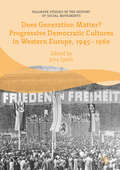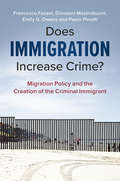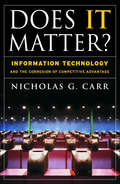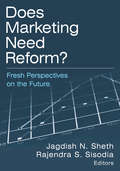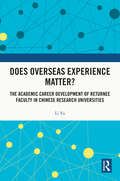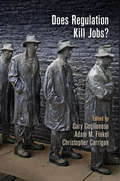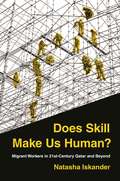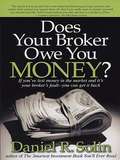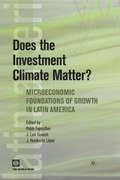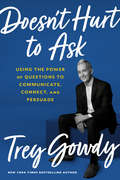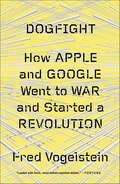- Table View
- List View
Does Generation Matter? Progressive Democratic Cultures in Western Europe, 1945–1960 (Palgrave Studies in the History of Social Movements)
by Jens Späth“Generation” has become a central concept of cultural, historical and social studies. This book analyses how this concept is currently used and how it relates to memory and constructions of historical meaning from educational, historical, legal and political perspectives. Attempts to compare different national generations or to elaborate boundary-crossing, transnational generations still constitute an exception. In trying to fill this gap, this collection of essays concentrates on one crucial moment of “the age of extremes” and on one specific generation: the year 1945 and its progressive politicians and intellectuals. Focusing on Italy, West Germany and France, it suggests that the concept of generation should be regarded as an open question in space and time. Therefore, this volume asks what role generation played in the intellectual and political debates of 1945: if it facilitated change, if it served as source of solidarity and cohesion and how post-war societies organized their time.
Does Global Liquidity Matter for Monetary Policy in the Euro Area?
by Helge Berger Thomas HarjesA report from the International Monetary Fund.
Does Globalization Lower Wages and Export Jobs?
by Matthew J. SlaughterA report from the International Monetary Fund.
Does Globalization Lower Wages and Export Jobs?
by Matthew J. Slaughter Phillip SwagelA report from the International Monetary Fund.
Does Immigration Increase Crime?: Migration Policy and the Creation of the Criminal Immigrant
by Francesco Fasani Giovanni Mastrobuoni Emily G. Owens Paolo PinottiDo migrants lead to an increase of crime rates in their host societies? This highly contentious issue has become a mainstay in the political debate and a lightning rod for the galvanization of populist movements, despite often lacking any empirical support. In this game-changing book, the authors examine what the existing data actually says, and provide their own novel evidence on the immigration-crime connection. Taking the unusual approach of analysing the subject from an economic perspective, the authors build on the pioneering work of Nobel Prize winner Gary Becker to construct their innovative arguments. By considering evidence from different countries, with a focus on establishing causal relationships, the authors are able to analyse not only if migrants do cause crime but also whether migration policies can play a role in shaping incentives for migrants to engage in crime. This book will appeal to students and academics across the social sciences, as well as citizens interested in this topical issue.
Does It Hurt To Ask?
by Alison Wood BrooksProfessor Alison Wood Brooks prepared this exercise as the basis for class discussion rather than to illustrate either effective or ineffective handling of an administrative situation.
Does It Matter?
by Nicholas G. CarrOver the last decade, and even since the bursting of the technology bubble, pundits, consultants, and thought leaders have argued that information technology provides the edge necessary for business success. IT expert Nicholas G. Carr offers a radically different view in this eloquent and explosive book. As IT's power and presence have grown, he argues, its strategic relevance has actually decreased. IT has been transformed from a source of advantage into a commoditized "cost of doing business"--with huge implications for business management. Expanding on Carr's seminal Harvard Business Review article that generated a storm of controversy, Does IT Matter? provides a truly compelling--and unsettling--account of IT's changing business role and its leveling influence on competition. Through astute analysis of historical and contemporary examples, Carr shows that the evolution of IT closely parallels that of earlier technologies such as railroads and electric power. He goes on to lay out a new agenda for IT management, stressing cost control and risk management over innovation and investment. And he examines the broader implications for business strategy and organization as well as for the technology industry. A frame-changing statement on one of the most important business phenomena of our time, Does IT Matter? marks a crucial milepost in the debate about IT's future. An acclaimed business writer and thinker, Nicholas G. Carr is a former executive editor of the Harvard Business Review.
Does Marketing Need Reform?: Fresh Perspectives on the Future
by Jagdish N Sheth Rajendra S SisodiaMany marketers fear that the field's time-worn principles are losing touch with today's realities. "Does Marketing Need Reform?" collects the insights of a select group of leading marketing thinkers and practitioners who are committed to restoring marketing's timeless values. The book sets the agenda for a new generation of marketing principles. As the editors note in their introduction; "Marketing is a powerful force backed up by huge resources. It must be entrusted only to those with the wisdom to use it well." The contributors seek to understand and explain how and why marketing has veered significantly off course in order to steer it back in the right direction. The concepts and perspectives presented in this book will inspire a renewed commitment to the highest ideals of marketing - serving customers individually and society as a whole by synergistically aligning company, customer, and social interests.
Does Openness to International Financial Flows Raise Productivity Growth?
by Eswar S. Prasad M. Ayhan Kose Marco E. TerronesA report from the International Monetary Fund.
Does Overseas Experience Matter?: The Academic Career Development of Returnee Faculty in Chinese Research Universities
by Li YuThe book explores the academic characteristics, career development, and impacts of “foreignness” of Chinese overseas returnees in research universities. It provides valuable insights into the international mobility of academics and the challenges and opportunities that returnee scholars face in terms of research, teaching, international exchange, income, academic promotion, job satisfaction, and career mobility in their academic careers. Using first-hand large-scale survey data, the author presents quantitative analyses of the international mobility of Chinese academics at the individual level. She evaluates the impact of overseas experience on academic career development, and further proposes practical policy suggestions to attract and retain returnee talent in academia in China. The book’s findings have important implications for policy-makers, university administrators, and academics who seek to address the challenges and opportunities of international academic careers and promote the internationalization of research universities in China and beyond.
Does Procyclical Fiscal Policy Reinforce Incentives to Dollarize Sovereign Debt?
by Anastasia Guscina Anna Ilyina Herman KamilA report from the International Monetary Fund.
Does Regulation Kill Jobs?
by Cary Coglianese Adam M. Finkel Christopher CarriganAs millions of Americans struggle to find work in the wake of the Great Recession, politicians from both parties look to regulation in search of an economic cure. Some claim that burdensome regulations undermine private sector competitiveness and job growth, while others argue that tough new regulations actually create jobs at the same time that they provide other benefits. Does Regulation Kill Jobs? reveals the complex reality of regulation that supports neither partisan view. Leading legal scholars, economists, political scientists, and policy analysts show that individual regulations can at times induce employment shifts across firms, sectors, and regions--but regulation overall is neither a prime job killer nor a key job creator. The challenge for policymakers is to look carefully at individual regulatory proposals to discern any job shifting they may cause and then to make regulatory decisions sensitive to anticipated employment effects. Drawing on their analyses, contributors recommend methods for obtaining better estimates of job impacts when evaluating regulatory costs and benefits. They also assess possible ways of reforming regulatory institutions and processes to take better account of employment effects in policy decision-making.Does Regulation Kills Jobs? tackles what has become a heated partisan issue with exactly the kind of careful analysis policymakers need in order to make better policy decisions, providing insights that will benefit both politicians and citizens who seek economic growth as well as the protection of public health and safety, financial security, environmental sustainability, and other civic goals.Contributors: Matthew D. Adler, Joseph E. Aldy, Christopher Carrigan, Cary Coglianese, E. Donald Elliott, Rolf Färe, Ann Ferris, Adam M. Finkel, Wayne B. Gray, Shawna Grosskopf, Michael A. Livermore, Brian F. Mannix, Jonathan S. Masur, Al McGartland, Richard Morgenstern, Carl A. Pasurka, Jr., William A. Pizer, Eric A. Posner, Lisa A. Robinson, Jason A. Schwartz, Ronald J. Shadbegian, Stuart Shapiro.
Does Skill Make Us Human?: Migrant Workers in 21st-Century Qatar and Beyond
by Natasha IskanderAn in-depth look at Qatar's migrant workers and the place of skill in the language of control and powerSkill—specifically the distinction between the “skilled” and “unskilled”—is generally defined as a measure of ability and training, but Does Skill Make Us Human? shows instead that skill distinctions are used to limit freedom, narrow political rights, and even deny access to imagination and desire. Natasha Iskander takes readers into Qatar’s booming construction industry in the lead-up to the 2022 World Cup, and through her unprecedented look at the experiences of migrant workers, she reveals that skill functions as a marker of social difference powerful enough to structure all aspects of social and economic life.Through unique access to construction sites in Doha, in-depth research, and interviews, Iskander explores how migrants are recruited, trained, and used. Despite their acquisition of advanced technical skills, workers are commonly described as unskilled and disparaged as “unproductive,” “poor quality,” or simply “bodies.” She demonstrates that skill categories adjudicate personhood, creating hierarchies that shape working conditions, labor recruitment, migration policy, the design of urban spaces, and the reach of global industries. Iskander also discusses how skill distinctions define industry responses to global warming, with employers recruiting migrants from climate-damaged places at lower wages and exposing these workers to Qatar’s extreme heat. She considers how the dehumanizing politics of skill might be undone through tactical solidarity and creative practices.With implications for immigrant rights and migrant working conditions throughout the world, Does Skill Make Us Human? examines the factors that justify and amplify inequality.
Does Third World Growth Hurt First World Prosperity?
by Paul KrugmanIn this article, Stanford economist Paul Krugman argues that fears about the impact of Third World competition are questionable in theory and flatly rejected by the data. After examining the consequences of isolated productivity improvements in three increasingly realistic economic models, Krugman concludes that an increase in Third World labor productivity means an increase in world output. And an increase in world output shows up in higher wages for Third World workers, not in decreased living standards for the First World. Yet if the West responds to the widespread fears about Third World economic success by erecting import barriers, the effects could be disastrous--dashing any hope of a decent living standard for hundreds of millions of people throughout the developing world.
Does This Company Need a Union? (HBR Case Study and Commentary)
by Constantine Von Hoffman Susan Schurman Jacqueline M. Blanchard Marick F. Masters Robert S. Atkin Fern FeilNo doubt about it, the top managers in this fictitious case study agree, Wellington Associates is a great place to work. Analysts at the high-tech consulting firm enjoy some of the best pay in the industry. And their benefits are extensive: flextime, liberal educational opportunities, comprehensive medical and dental coverage, generous vacation leave, and even on-site day care. So it came as something of a shock to CEO Jane Wellington and her top executives when HR chief Elvin Cusack started out the weekly senior-management meeting by declaring that the United Office Workers Union had begun organizing the support staff. Turns out, Cusack explained, that the company looks very different from the support staff's point of view. Although their starting salaries are indeed competitive, raises average a mere 2% to 3%, and promotions to professional ranks are rare. Medical and dental coverage take a greater chunk out of clerical pay than out of the larger professional salaries, and the cost of the day care center is pretty much out of reach for the support staff. Flextime is impractical for workers who need to be in the office to answer phones and to file papers. Worse, the support staff is expected to accommodate the analysts' flexible schedules; if an analyst decides to work late to finish a project, the secretary has to stay as well. What to do? Suggestions ranged from "fire 'em" to "say nothing before calling in legal counsel." Five commentators examine Wellington's options and its legal obligations. In 98311 and 98311Z, Susan Schurman, Marick F. Masters, Robert S. Atkin, Jacqueline M. Blanchard, and Fern Feil examine Wellington's options and its legal obligations.
Does Your Broker Owe You Money?
by Daniel R. SolinThey say you only need to trust four people: your shrink, your lawyer, your priest, and your broker. However, many Americans have learned that placing unconditional trust in a broker was a mistake. An unprecedented number of inexperienced investors are now in the market, and many of the staggering losses incurred by them in the last two years were caused by broker fraud. If you lost money, were you a victim of the market, of your own inexperience, or of fraud? Can the law get your money back? In Does Your Broker Owe You Money? securities attorney Daniel Solin describes how the brokerage business works and how unscrupulous brokers profit illegally. Solin explains common forms of broker fraud -- such as churning, frontrunning, and unauthorized trading -- as well as more subtle forms such as inappropriate diversification. In clear terms, he helps you determine if you have a claim. Most important, he outlines what to do next, walking you through the arbitration process -- the means by which most such cases are resolved.
Does the Capital Asset Pricing Model Work?
by David W. Mullins Jr.The capital asset pricing model (CAPM) is a theoretical representation of the way financial markets behave. It can be used to estimate a company's cost of equity capital in investment management decisions. Managers can also use CAPM to calculate divisional hurdle rates and risks of acquisitions. CAPM is based on specialized assumptions including frictionless markets without imperfections, such as transaction costs, taxes and restrictions on borrowing and short selling. It requires limiting assumptions concerning the statistical nature of securities' returns and investors' preferences, and it assumes investors' agreements on likely performance and risk of securities.
Does the Exchange Rate Regime Matter for Inflation and Growth?
by International Monetary FundA report from the International Monetary Fund.
Does the Investment Climate Matter?
by Pablo Fajnzylber J. Humberto Lopez Jose Luis GuaschAlthough the Latin American region's growth rates are at a three decade high, they have been historically disappointing in relative terms, which cannot be dissociated from the microeconomic environment in which firms operate. Policy makers may need to complement their focus on macroeconomic stability with an increased emphasis on microeconomic reforms. By providing empirical evidence linking actual firm performance to shortcomings in Latin America's investment climate, the book discusses policies that could have a significant impact on firm productivity by improving the environment in which firms invest and operate.
Doesn't Hurt to Ask: Using the Power of Questions to Communicate, Connect, and Persuade
by Trey GowdyFormer congressman and prosecutor Trey Gowdy teaches you how to effectively communicate and persuade on the issues that matter most to you, drawing on his experience in the courtroom and the halls of Congress. &“A must-read for people who want to learn how best to succeed.&”—Dana Perino, Fox News host and bestselling author of And the Good News Is . . .You do not need to be in a courtroom to advocate for others. You do not need to be in Congress to champion a cause. From the boardroom to the kitchen table, opportunities to make your case abound, and Doesn&’t Hurt to Ask shows you how to seize them. By blending gripping case studies from nearly two decades in a courtroom and four terms in national politics with personal stories and practical advice, Trey Gowdy walks you through the tools and the mindset needed to effectively communicate your message.Along the way, Gowdy reflects on the moments in his life when he learned the most about how to argue and convince. He recounts his missteps during his first murder trial, the conversation that changed his view on criminal justice reform, and what he learned while questioning James Comey and Secretary Hillary Clinton.Sharing the techniques he perfected advocating in law and politics, Gowdy helps you identify your objective, understand your personal jury, and engage in the art of questioning so you can be heard, be understood, and, ultimately, move others. Whether it&’s getting a boss to take a chance on your idea, convincing someone to support your cause, or urging a child to invest more effort in an important task, movement requires persuasion. Doesn&’t Hurt to Ask shows you how to persuade, no matter the jury and no matter the cause.
Dogfight at the Pentagon
by Wall Street JournalDiscover the story behind these and more in this delightful collection of the wild, the weird, and the wonderful, culled from The Wall Street Journal's popular and long-standing A-Hed column.One of the The Wall Street Journal's most popular features for more than seventy years, the daily A-Hed column--named for a headline that looked like a letter A--has diverted readers from the more glum news of war, economic woe, natural disasters, and man-made malfeasance. Covering a wide range of lunacy and the unusual from across the nation and the world, the A-Hed continues to enchant longtime readers.Now, the best A-Hed stories from recent years have been bundled into this entertaining volume. There are romantic tales, including the Japanese "infidelity phone" (it keeps trysts secret) and the story of "wingmen" and "wingwomen" who escort wallflowers to nightspots and maneuver them into the arms of prospective catches. Lovers of dogs, cats, and fish will learn how a Marine Corps bulldog got promoted to sergeant, how a grumpy cat acquired a Hollywood agent, and will be left wondering if a sixty-three-pound carp named Benson died of natural causes in England--or was the victim of foul play. Funny, moving, and charming, these stories will make you laugh and keep you entertained.
Dogfight over Europe: Ryanair (A)
by Jan W. RivkinIn April 1986, the Ryan brothers announce that their fledging Irish airline Ryanair will soon commence service between Dublin and London. For the first time, Ryanair will face formidable competitors such as Aer Lingus and British Airways on a major route. Students are asked to assess Ryanair's entry and anticipate the response of incumbent carriers.
Dogfight: How Apple and Google Went to War and Started a Revolution
by Fred VogelsteinBehind the bitter rivalry between Apple and Google—and how it's reshaping the way we think about technologyThe rise of smartphones and tablets has altered the industry of making computers. At the center of this change are Apple and Google, two companies whose philosophies, leaders, and commercial acumen have steamrolled the competition. In the age of Android and the iPad, these corporations are locked in a feud that will play out not just in the mobile marketplace but in the courts and on screens around the world. Fred Vogelstein has reported on this rivalry for more than a decade and has rare access to its major players. In Dogfight, he takes us into the offices and board rooms where company dogma translates into ruthless business; behind outsize personalities like Steve Jobs, Apple's now-lionized CEO, and Eric Schmidt, Google's executive chairman; and inside the deals, lawsuits, and allegations that mold the way we communicate. Apple and Google are poaching each other's employees. They bid up the price of each other's acquisitions for spite, and they forge alliances with major players like Facebook and Microsoft in pursuit of market dominance.Dogfight reads like a novel: vivid nonfiction with never-before-heard details. This is more than a story about what devices will replace our cell phones and laptops. It's about who will control the content on those devices and where that content will come from—about the future of media and the Internet in Silicon Valley, New York, and Hollywood.
